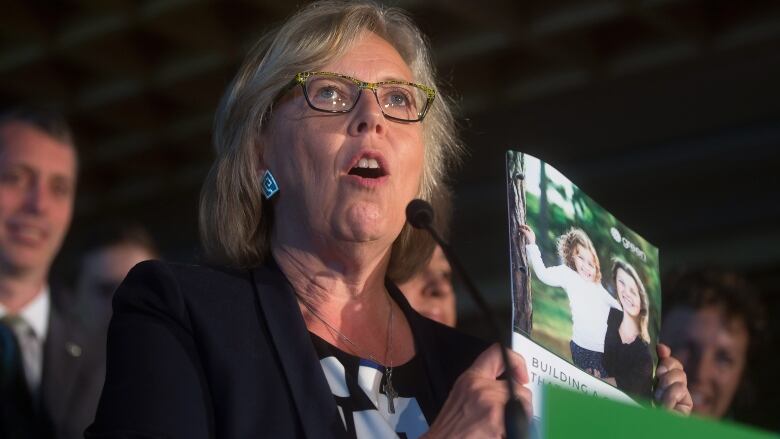Green Party may not be able to ride wave of change
Desire for change could work against candidates with no strong chance of winning

It's hard to imagine a more Green-friendly voter than Katherine Smith. The Victoria mother of two has always been a Green Party supporter, and even has a Green sign at her house.
But when NDP candidate Murray Rankin approaches, Smith doesn't brush him aside. Instead, she listens to his pitch, and realizes her mind may not be as made up as she thought.
"I have always been a Green Party supporter, because I like a lot of their policies on the environment and I think [Elizabeth May] is very clear on what they are," Smith said. "But like a lot of Canadians, I want to see change. So for the last few days I have been undecided a little bit because I want to make sure we are free of Mr. Harper."
It's a sentiment the local Green candidate, Jo-Ann Roberts, is hearing a lot. Voters answering the doors are clearly sympathetic to the former CBC Radio host, and they understand the issues at hand.
But most are also well aware Roberts is running for a party with almost no chance of forming government. And therein lies the problem for the fledgling politician.
"I run into a lot of people that say, 'I want to vote Green, but I'm worried about Stephen Harper getting back into power," said Roberts. "We have that discussion on almost every doorstep."
The desire for change is turning out to be one of the central narratives of the 2015 federal election campaign. It's a mood the Greens believe should favour their chances.
But for the first time since May became leader of the party a decade ago, many Green supporters say they're considering going somewhere else, because of that desire for change.
What is happening in Victoria is indicative of what Green candidates are facing across the country.
In its history, the Green Party has only won a single seat.
May came to British Columbia in 2011 with new hope after running unsuccessfully in Nova Scotia.
Her victory in Saanich-Gulf Islands gave the party more credibility. Then Bruce Heyer quit the NDP caucus and was quickly anointed the Green MP for Thunder Bay.
But now the Greens are in a new situation. Their supporters are expecting more. So the party decided to heavily focus on five ridings on Vancouver Island.
May's time and party resources have been plunked into her own riding as well as those of Victoria, Nanaimo-Ladysmith, Esquimalt-Saanich-Sooke and Cowichan-Malahat-Langford.
Voting for a prime minister
University of Victoria political scientist Jamie Lawson says the Greens have achieved credibility during the last Parliament.
But that won't guarantee them more seats in a race that appears to be as much a referendum on leadership as it is a debate on ideas.
"I think during the election the Greens have had a problem being heard in part because of a presumption that this is really about who the prime minister is going to be," Lawson says. "We can see polling results that see a strong dissatisfaction of the current government and a relative indifference of means of getting there."
The Greens say they are different to the other parties: unbeholden to corporations and lobby groups and firmly on the side of the environment.
"The goal is not to focus on our own benefits as the Green Party, but for the benefits of all Canadians," May says. "It is possible for Green MPs to do more than the other MPs by working in a coalition government."
Simon Fraser University environmental economist Mark Jaccard says he won't vote for the Greens, not because of policy differences, but because of the impact of a single vote.
"If I was in Elizabeth May's riding I would vote Green," he says. "But if I'm not in that riding I would vote for the party who has the best chance of defeating and gaining on the Conservative candidate."
Jaccard says a Green vote would count in a system of proportional representation but it gets lost in a first-past-the-post vote. And from a strategic point of view, a vote for a candidate without a legitimate chance at winning, could be a vote that might help the Conservatives.
Not surprisingly, the Greens have promised to change the voting system to more accurately reflect the popular vote if they get elected.
But then so have their rivals.
